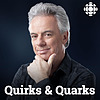
Quirks and Quarks
CBC
Catégories: Sciences et Médecine
Écoutez le dernier épisode:
This researcher wants a new particle accelerator to use before she’s dead
Physicists exploring the nature of reality need ever more capable particle colliders, so they’re exploring a successor to the Large Hadron Collider in Europe. But that new machine is at least decades away. Tova Holmes, an assistant professor at the University of Tennessee, Knoxville, is one of the physicists calling for a different kind of collider that can come online before the end of her career – or her life. This device would use a particle not typically used in particle accelerators: the muon.
Is venting the best way to deal with anger? The scientist says chill out.
It turns out that acting out your anger might not be the best way to get rid of it. Sophie Kjaervik, a researcher at Virginia Commonwealth University in Richmond, Va., analyzed 154 studies of the different ways to deal with anger. Her results, published in the journal Clinical Psychology Review, suggest that techniques that reduce your heart rate and calm your mind are more effective than blowing off steam.
High intensity wildfires may release toxic forms of metals
Wildfire smoke might be more dangerous than you think. A recent study in the journal Nature Communications found that when wildfires pass over soils or rocks rich in a normally harmless metal called chromium, it is transformed into a toxic form. The hotter and more intense the wildfire is, the more of this metal becomes toxic. Scott Fendorf, an Earth system science professor at Stanford University, said this study shows we should factor in the type of geology wildfires pass over to provide more targeted air quality warnings about smoke risks.
AI might help solve the problem of runaway conspiracy theories
Conspiracy theories seem to have multiplied in the internet era and so far, we haven’t had much luck in debunking these beliefs. The preliminary findings of a new study on PsyArXiv, a site for psychology studies that have yet to be peer-reviewed, suggests that artificial intelligence may have more success. Thomas Costello, a postdoctoral psychology researcher at MIT was the lead author on this study, and said their findings can provide a window into how to better debunk conspiracy beliefs.
An Indigenous ecologist on why we need to stop and listen to save the planet
Earth day is April 22. And Earth is not in great shape to celebrate the day. Overheated, overpopulated, overexploited – we’re not being particularly careful with our planet. We talk to Indigenous ecologist Jennifer Grenz, of the University of British Columbia, about her new book, which is part memoir, part prescription for the medicine our planet needs – a compound of science and traditional wisdom. Her book is Medicine Wheel for the Planet: A journey toward personal and ecological healing.
Épisodes précédents
-
611 - Why this Indigenous researcher thinks we can do science differently, and more…Sat, 20 Apr 2024
-
610 - COVID-19’s “long tail” includes a range of impacts on the brain and more…Fri, 12 Apr 2024
-
609 - The dark side of LED lighting and more,,,Fri, 05 Apr 2024
-
608 - An Australian Atlantis and other lost landscapes, and more...Thu, 28 Mar 2024
-
607 - The future of freshwater — will we have a drop to drink, and more.Fri, 22 Mar 2024
-
606 - How animals eating, excreting and expiring is like the world's bloodstream, and moreFri, 15 Mar 2024
-
605 - How disabled primates thrive in the wild and more…Fri, 08 Mar 2024
-
604 - The boreal forest is on the move, and we need to understand how, and more...Fri, 01 Mar 2024
-
603 - Icelanders reap the costs and benefits of living on a volcanic island and more…Fri, 23 Feb 2024
-
602 - A post valentine’s look at humpback mating songs and a marsupial that’s sleepless for sexFri, 16 Feb 2024
-
601 - Scientists explore which came first, the chicken or the egg, and more…Fri, 09 Feb 2024
-
600 - An ancient tree’s crowning glory and more…Fri, 02 Feb 2024
-
599 - The aftermath of a record-smashing volcano: Hunga Tonga–Hunga Haʻapai two years later, and more...Fri, 26 Jan 2024
-
598 - Can diet and exercise be replaced by pills and more…Fri, 19 Jan 2024
-
597 - Could buried hydrogen help save the world, and more…Fri, 12 Jan 2024
-
596 - A Cave of bones could rewrite the history of human evolution, and more…Fri, 05 Jan 2024
-
595 - Our annual holiday question showFri, 29 Dec 2023
-
594 - Seasonal science with reindeer, special stars and miracle babies…Fri, 22 Dec 2023
-
593 - The Quirks & Quarks holiday book show!Fri, 15 Dec 2023
-
592 - A young carnivorous dinosaur’s last meal and moreFri, 08 Dec 2023
-
591 - Cat facts — the latest science on our feline companionsFri, 01 Dec 2023
-
590 - How biodiversity contributes to human health and more…Fri, 24 Nov 2023
-
589 - Alien blobs in the Earth’s mantle, and much moreFri, 17 Nov 2023
-
588 - Eating fossil fuels, sea stars get a head, Right whale diet, music soothes pain and does biology suggest we lack free will?Fri, 10 Nov 2023
-
587 - AI research prize and risks, football and lifespan, smart glasses see with sound, most powerful solar storm and killer whale contaminationFri, 03 Nov 2023
-
586 - Antarctic ice will melt for a century, the necrobiome recycles your corpse,how apes hang around, brain waves characterize false memories, and finding the biosignatures of long COVIDFri, 27 Oct 2023
-
585 - NASA’s metal mission, hungry hippos chew badly, music synchronizes us, cicada boom is trees bane and risks and rewards of deep sea miningMon, 23 Oct 2023























